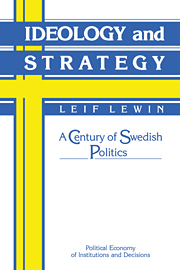Book contents
- Frontmatter
- Contents
- List of tables
- Series editors' preface
- Author's preface
- 1 The problem of rationality
- 2 Tariffs
- 3 Suffrage
- 4 Parliamentarism
- 5 The crisis agreement
- 6 Economic planning
- 7 The supplementary pension system
- 8 Nuclear power
- 9 Employee investment funds
- 10 Strategic action in politics
- Appendix
- Index
- Frontmatter
- Contents
- List of tables
- Series editors' preface
- Author's preface
- 1 The problem of rationality
- 2 Tariffs
- 3 Suffrage
- 4 Parliamentarism
- 5 The crisis agreement
- 6 Economic planning
- 7 The supplementary pension system
- 8 Nuclear power
- 9 Employee investment funds
- 10 Strategic action in politics
- Appendix
- Index
Summary
UPPER-CLASS RULE OR POPULAR RULE?
The tariff dispute was over. For the first time, the people had let their voice be heard. The actual opinion they had expressed was a matter of debate. But one thing was clear: The issue of the people's right to play a part in governing the country had irrevocably arrived on the political agenda.
The tariff issue was depoliticized soon after the 1888 law was adopted; it was like a flame that had flared up quickly in the forecourt of Swedish parliamentism. Succeeding it as the new, dominant political litmus test was the suffrage issue. With their roots among broad categories of urban consumers, free traders were usually supporters of expanded suffrage, whereas the protectionists, with their base among prosperous rural freeholders, feared the urban masses and opposed a broader franchise. But as we have seen, there were also free traders who opposed radical reforms of voting rights. During a transitional period there is thus reason to count not only the Left (mainly Liberals and Social Democrats) and the Right (mainly Conservatives, who coalesced into a modern party soon after the turn of the century) but also a third party. In this case it was “the moderate free traders,” who in the two-dimensional Swedish domestic politics of the early 1890s combined support of free trade with opposition to universal manhood suffrage, before the voting rights issue overshadowed all other issues.
- Type
- Chapter
- Information
- Ideology and StrategyA Century of Swedish Politics, pp. 53 - 86Publisher: Cambridge University PressPrint publication year: 1989



